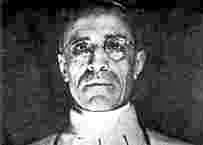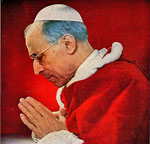|
from DavidIcke Website
The day was chosen carefully, what others might perceive
as the beginning of a banking career, to a Rothschild it was
entering into a priesthood. At twenty-two, Guy was assigned letters
to write. One of his correspondents was a Cardinal Pacelli,
future Pope Pius XII, then in charge of Holy office
finances, and who kept a small account at MM. de Rothschild
Freres.
Pacellli was arguably the most dangerous churchman in modern
history. As Pontiff during World War II, not only did he fail to
speak out against Hitler’s Final Solution, but he personally made
the Final Solution possible!
As papal nuncio in Munich and Berlin in the 1920’s, he used cunning and moral blackmail to impose Rome’s power on Germany.
In 1933, he negotiated a treaty with Hitler,
the Reich Concordat, which ensured that the Nazis
would rise unopposed by the most powerful Catholic community in the
world-sealing, by Hitler’s own admission, the fate of the Jews in
Europe.
The Black
Nobility were a small group of aristocratic families of Rome who had
stood by the popes following the seizure of their dominions in the
bitter struggle for the creation of the nation-state of Italy... Pacelli’s father and grandfather before him owed their distinction
to membership of the caste of lay Vatican lawyers in the service of
the papacy.
While raising ten children (his second child
being Eugenio’s father, Filippo, born in 1837), Marcantonio
became a key official in the service of Pius IX, popularly
known as Pio Nono.
Three years after his coronation, it looked as if Pio Nono had ignominiously lost his sovereignty over the Eternal City to a republican mob.
On November 15, 1849, Count Pellegrino Rossi, a lay government minister of the papal states, famous for his biting sarcasm, approached the Palazzo della Cancelleria in Rome and greeted a sullen waiting crowd with a contemptuous smile. As he was about to enter the building, a man leapt forward and stabbed him fatally in the neck.
The next day, the Pope’s Quirinal summer palace above the city was sacked, and Pio Nono, disguised in a priest’s simple cassock and a pair of large spectacles, fled to the seaside fortress of Gaeta within the safety of the neighboring kingdom of Naples.
He took with him Marcantonio Pacelli as his legal and political adviser. From this fastness, Pio Nono hurled denunciations against the "outrageous treason of democracy" and threatened prospective voters with excommunication.
Only with the help of French bayonets, and a
loan from the Rothschild’s, did Pio Nono contrive to return
to the Vatican a year later to resume a despised reign over the city
of Rome and what was left of the papal territories.
|

 In
the book,
In
the book,
 Eugenio
Pacelli was described routinely, during his pontificate and
after his death, as a member of
Eugenio
Pacelli was described routinely, during his pontificate and
after his death, as a member of